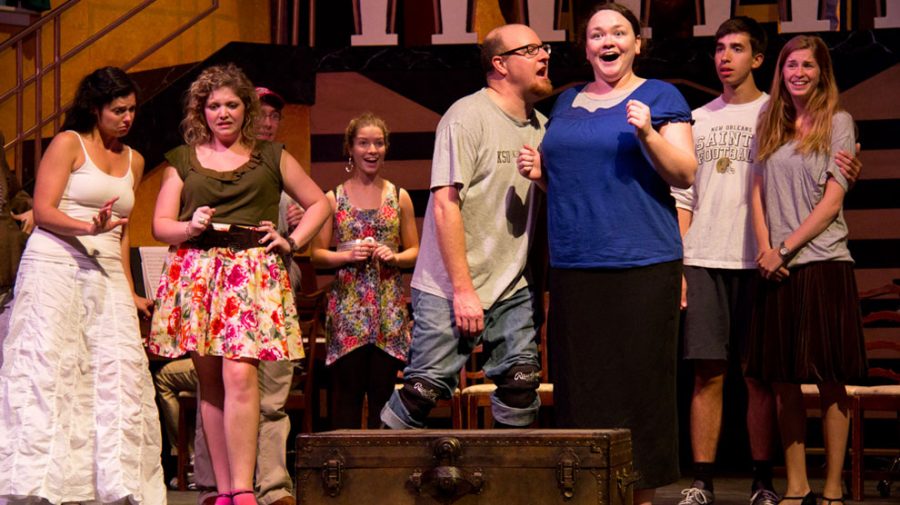The best thing about the Department of Theatre and Dance’s current production of “Animal Crackers” is that it never stops trying to be funny. I was worried they would treat the Vaudeville-era farce as some kind of theatrical museum exhibition, passing off the Marx Brothers’ puns and slapstick as relics of a bygone day in comedy. But after an opener with Abbot and Costello’s iconic “Who’s on First?” done by cavemen, it was clear that “Animal Crackers” isn’t about “Animal Crackers” – it’s about being funny.
Thank goodness they didn’t muddy up the jokes with a bunch of plot. French fat-cat Roscoe W. Chandler is throwing a party for the unveiling of his newly acquired masterpiece at the home of busty matron Mrs. Rittenhouse, but the life of the party is famous African explorer Captain Jeffrey. He’s fearless, dashing…and faints at caterpillars. When Rittenhouse’s daughter Arabella hatches a plot to switch the painting with her boyfriend’s copy to show off the wannabe artist’s – Hey, look, Harpo just stole that guy’s hat!
You see, in the land of the Marx Brothers, the joke is king. Let yourself care about the story, and you’re in for a rough time. But then again, if you care about the story too much, the show isn’t doing things right.
This is comedy wholesale, from a time when men in top hats lobbed armfuls of jokes into the crowd and hoped some of them stuck. These guys knew how to grab an early laugh and hold tight, rattling off gags like a machine gun and never giving the audience a chance to think too much. You don’t care how lowbrow the innuendo or cheap the pun – you’re too busy being in stitches.
Director Seth Panitch gets it. With nothing but an on-stage piano and drum set (for the vital “badum-tish!”), he runs the gamut on the Founding Fathers of pratfalls, everything from hat-switch antics to the ol’ make-them-think-it’s-a-mirror routine (and you thought Scooby Doo invented that one).
But the audience didn’t seem to buy it as much as the performers. The songs are peppy but disposable and most just screw with the pacing, which is strangely uneven and overall too slow. Some songs aren’t really funny at all, and two or three minutes without a gag is the kiss of death for a style that works by giving the audience a chronic case of the sillies. When the show does take off, it doesn’t have the momentum to stay in the air.
Fortunately, the stars help keep things alive. Tommy Walker gives Italian swindler Emmanuel Ravelli (originally Chico Marx) incandescent charm, and Caroline Schmidt’s silent trickster The Professor (Harpo) soaks her scenes in goofball mirth. The biggest burden of line-gags falls to David Lewis (Groucho), whose Captain Spaulding unloads puns and innuendos with lovely irreverence, though some of the jokes get lost in his accent. The Brothers are the lifeblood of the show, but the charm of the whole ensemble helps keep the mood when you hear crickets in the audience.
But this is a different comedic dialect, and the actors can’t help but play it with an accent. Back in the day, comedians improvised and broke the fourth wall to keep the audience warm when a joke fell flat. The UA ensemble does its best, but they’re stuck with double roles. Lewis doesn’t play Captain Spaulding – he plays Groucho Marx playing Captain Spaulding, leaving him without the genuineness needed to drum up real chemistry with the audience.
Not to say the show isn’t sincere. It really shines when the UA troupe makes it its own. Added gags about the school, the theatre department, and Tuscaloosa get some of the best laughs, but the revisions don’t stop there. The performance grafts in bits from Abbot and Costello, the Three Stooges and other comedic greats.
In one gutsy move, the show takes a startling turn to the sentimental and plays a montage of clips from the heroes of the era, from Charlie Chaplain to “I Love Lucy.” It’s an enormous risk, but it works.
The UA troupe doesn’t make “Animal Crackers” – it makes an homage to comedy.









